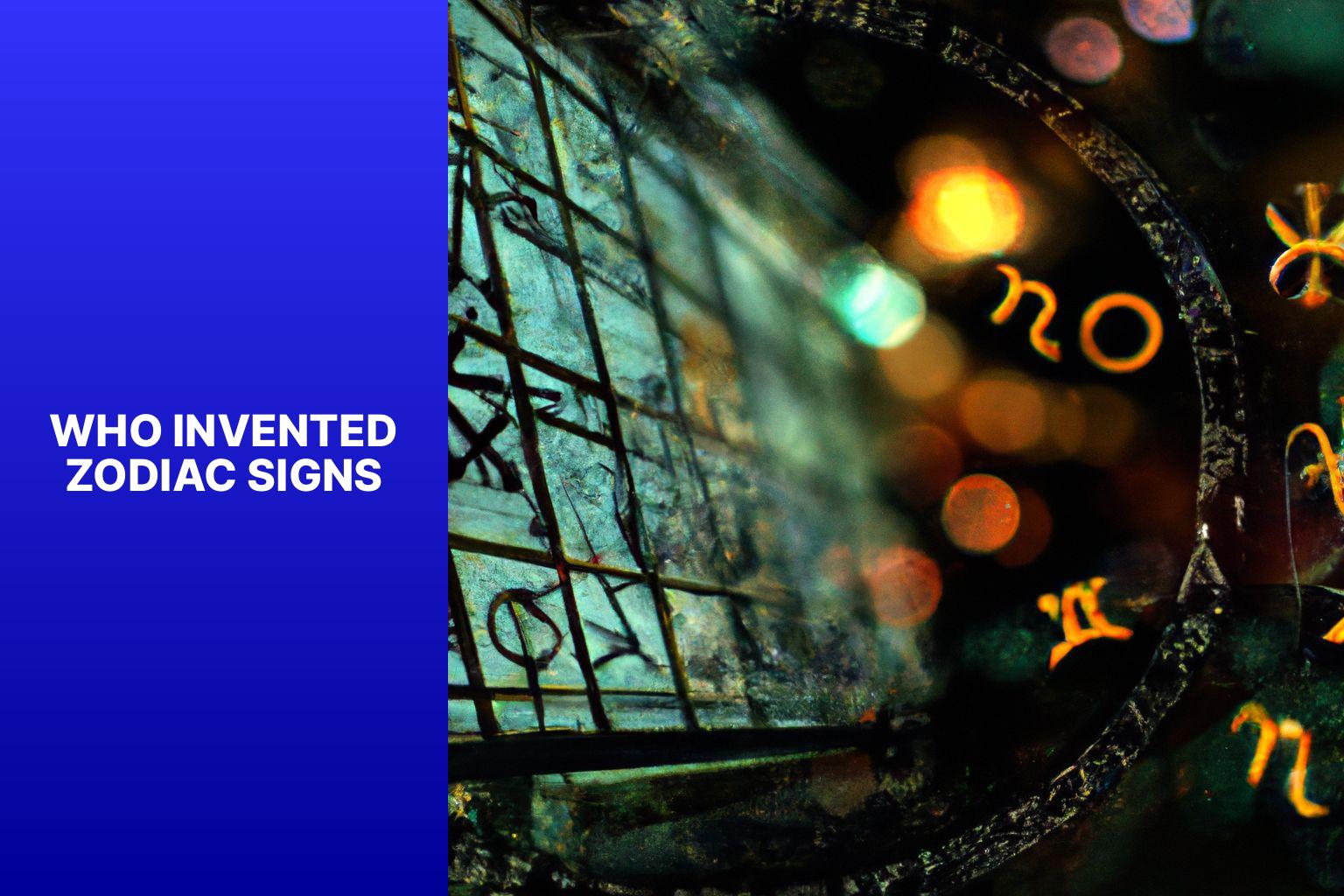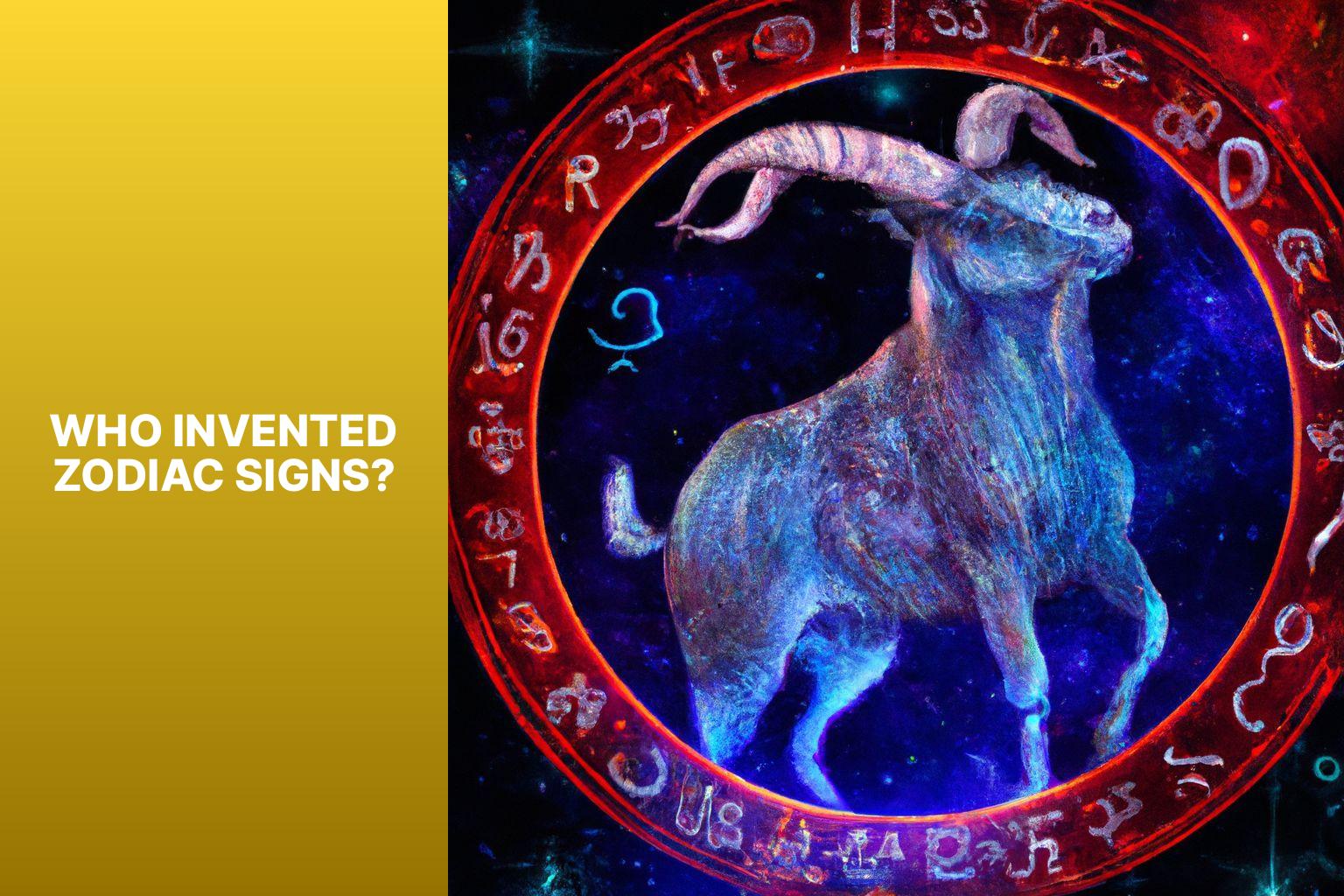The history of zodiac signs dates back to ancient times, with various civilizations and cultures contributing to their development. Understanding the origins of zodiac signs provides a fascinating insight into the evolution of astrology.
Ancient astrology and zodiacs can be traced back to Mesopotamia, where the Babylonians played a significant role in shaping astrological practices. They observed the movements of celestial bodies and developed a system of dividing the sky into sections, known as the zodiac.
The Greek civilization also made important contributions to the zodiac signs. They introduced the concept of twelve signs, each associated with different constellations and corresponding to different periods of the year. This Greek zodiac system has become the basis for Western astrology as we know it today.
While the concept of zodiac signs emerged from the collective efforts of various cultures, the Greek astronomer and astrologer Ptolemy played a crucial role in solidifying their structure and providing mathematical calculations for interpreting astrological charts. The role of Hellenistic astrologers in refining the zodiac signs cannot be overlooked.
Furthermore, other cultures have also influenced the development of zodiac signs. Indian astrology, with its unique system of nakshatras or lunar mansions, has had a significant impact. The Chinese zodiac, rooted in the Chinese calendar, assigns animals to each year in a twelve-year cycle, contributing to a distinct cultural interpretation of zodiac signs.
1. Zodiac signs have a long history, originating from ancient astrology and the influence of Babylonian astrology.
2. The Greek contribution to zodiac signs included the development of the twelve signs of the Greek zodiac.
3. The invention of zodiac signs can be attributed to various sources, including Ptolemy and the development of Western astrology, as well as the role of Hellenistic astrologers.
4. Other cultures, such as Indian astrology and the Chinese zodiac, have also had an impact on the development and interpretation of zodiac signs.
History of Zodiac Signs
Unravel the captivating history of zodiac signs as we delve into ancient astrology and the influence of Babylonian astrology. Discover the origins and fascinating cultural significance behind these celestial symbols that have shaped our understanding of personality traits and future predictions. Prepare to immerse yourself in a journey through time, exploring the rich tapestry of beliefs and practices that laid the foundation for the zodiac signs we know today.
Ancient Astrology and Zodiacs
Ancient astrology and zodiacs played a vital role in shaping the astrology we know today. The development of astrological practices and the concept of zodiac signs can be traced back to ancient civilizations such as the Mesopotamians, Egyptians, and Greeks.
The Babylonians, particularly the Mesopotamians, were pioneers in establishing a system of astrology. They held the belief that celestial events and the positions of the stars and planets held insights into earthly matters. The Babylonians were responsible for creating the zodiac, which divided the sky into twelve equal parts, each associated with a specific constellation.
The Egyptians also possessed their own astrological beliefs, linking certain constellations to their gods and utilizing celestial observations for agricultural purposes. They held the belief that the movement of the stars and planets influenced human destiny.
During the Hellenistic period, the Greek civilization further expanded on the knowledge of astrology and zodiac signs. Greek philosophers like Ptolemy developed intricate theories about celestial influences on human life and behavior.
Ancient astrology and zodiacs formed the foundation for the development of Western astrology. They provided the groundwork for comprehending the positions of celestial bodies and their potential impact on human lives. Today, astrology continues to be studied and practiced, with ancient astrology and zodiacs serving as significant influences in this field of study.
The Influence of Babylonian Astrology
The significance of Babylonian astrology on the development of zodiac signs cannot be understated. Babylonian astrology played a pivotal role in shaping our understanding and interpretation of celestial patterns and their impact on human lives.
1. Developed in ancient Mesopotamia, Babylonian astrology was the first system to identify and classify the twelve signs of the zodiac. These signs were associated with different constellations and utilized for predicting future events and comprehending individual characteristics.
2. The Babylonians acknowledged the paramount importance of celestial bodies, including the planets and the moon, in shaping human destiny. They meticulously recorded and analyzed celestial movements, devising intricate systems to interpret their influence on human lives.
3. The influence of Babylonian astrology transcended various cultures and civilizations, encompassing the Greeks and the Romans. It laid the groundwork for future advancements in astrology and the eventual development of the zodiac signs that are widely recognized today.
4. Babylonian astrologers firmly believed that a person’s personality traits and future outcomes were determined by the position of the planets and stars at the time of their birth. This conviction in the celestial influence became a fundamental aspect of astrology.
Understanding the influence of Babylonian astrology is fundamental to comprehending the origins and significance of zodiac signs. It exemplifies the rich history and cultural exchange that contributed to the development of astrology as we know it today.
To delve deeper into this subject, consider researching the specific methods employed by Babylonian astrologers and how their interpretations differed from those of later cultures. Investigating the historical impact of Babylonian astrology on other aspects of human civilization, such as religion and governance, will also yield valuable insights.
The Greek Contribution
The Greek contribution to the world of zodiac signs is fascinating! Let’s dive into it and uncover the secrets behind the twelve signs of the Greek Zodiac. Brace yourself for an exciting journey into ancient mythology, celestial symbolism, and the wondrous connections between astrology and Greek culture. Get ready to be intrigued as we explore the origins and significance of each of these twelve captivating signs.
The Twelve Signs of the Greek Zodiac
| Aries | Taurus | Gemini | Cancer | Leo | Virgo | Libra | Scorpio | Sagittarius | Capricorn | Aquarius | Pisces |
| March 21 – April 19 | April 20 – May 20 | May 21 – June 20 | June 21 – July 22 | July 23 – August 22 | August 23 – September 22 | September 23 – October 22 | October 23 – November 21 | November 22 – December 21 | December 22 – January 19 | January 20 – February 18 | February 19 – March 20 |
The Twelve Signs of the Greek Zodiac are Aries, Taurus, Gemini, Cancer, Leo, Virgo, Libra, Scorpio, Sagittarius, Capricorn, Aquarius, and Pisces. Each sign corresponds to a specific period of the year. Aries begins the zodiac calendar and represents those born between March 21 and April 19. Taurus follows, spanning from April 20 to May 20. Gemini covers May 21 to June 20, while Cancer represents those born between June 21 and July 22. Leo encompasses the period from July 23 to August 22.
Virgo represents individuals born between August 23 and September 22. Libra follows from September 23 to October 22, and Scorpio covers October 23 to November 21. Sagittarius spans from November 22 and December 21, followed by Capricorn from December 22 to January 19.
Aquarius represents those born between January 20 and February 18, while Pisces spans from February 19 to March 20, completing the Greek Zodiac. Each sign is associated with unique characteristics and traits, which are believed to influence a person’s personality and destiny.
In a similar tone, it is said that a Greek philosopher once witnessed a group of people arguing endlessly over their zodiac signs, claiming that these signs defined their personalities. Amused by this, the philosopher joined the conversation and listened intently. He then quietly declared that regardless of their signs, what truly mattered was how they treat others and contribute to society. This wise perspective reminded everyone that while the Greek Zodiac can be intriguing and entertaining, it is ultimately our actions and character that have the greatest impact on our lives and those around us.
Who Invented Zodiac Signs?
Photo Credits: Www.Astrostarworld.Com by Joe Allen
Discover the fascinating origins of zodiac signs and unravel the mystery behind their creation. We’ll dive into the historical narratives of renowned figures such as Ptolemy and explore their contributions to the development of Western astrology. We’ll uncover the crucial role played by Hellenistic astrologers, shedding light on the evolution of this ancient practice. Prepare to embark on a captivating journey through time as we unravel the story behind who invented zodiac signs.
Ptolemy and the Development of Western Astrology
Ptolemy played a significant role in the development of Western astrology. He was a Greek astronomer, mathematician, and astrologer who lived in the 2nd century AD. Ptolemy’s work focused on combining the principles of Greek astrology with the astronomical knowledge of his time, contributing to the development and evolution of Western astrology over the centuries. He emphasized the importance of observing the positions and movements of celestial bodies to gain insights into human behavior and events on Earth.
During this time, Ptolemy wrote the “Tetrabiblos,” a comprehensive treatise on astrology that had a lasting impact on the field. In his book, Ptolemy introduced the concept of the zodiac, dividing the ecliptic into twelve equal parts, each corresponding to a specific constellation. This concept became a fundamental aspect of Western astrology. Ptolemy assigned distinct qualities and characteristics to each zodiac sign, forming the foundation for the astrology we practice today.
Ptolemy’s teachings became influential in the Hellenistic era, and subsequent astrologers in the Western world widely studied and referenced his works. His ideas and methodologies became essential components of astrology, providing a framework for interpreting celestial phenomena and their impact on human lives. The connections he made between celestial bodies and earthly events paved the way for the development and evolution of Western astrology.
Even today, Ptolemy’s contributions, particularly his emphasis on the zodiac, continue to be studied and practiced by astrologers worldwide. The lasting legacy of Ptolemy in the field of Western astrology highlights his profound impact on its development and perpetuation.
The Role of Hellenistic Astrologers
The role of Hellenistic astrologers in the development of Western astrology was of great significance. These astrologers, including Claudius Ptolemy, made substantial contributions to the field during the Hellenistic period. Ptolemy’s renowned work, “Tetrabiblos,” became a fundamental text in astrology and had a lasting influence on Western astrology for centuries.
It was these astrologers who introduced innovative concepts, such as dividing the zodiac into twelve signs, which are still widely used in astrology today. Additionally, they developed techniques for interpreting the positions and aspects of planets and other celestial bodies.
These Hellenistic astrologers also incorporated elements from various cultures, such as Babylonian astrology and Egyptian symbolism, into their practices. This integration of ideas and influences played a crucial role in the evolution and growth of astrology.
Moreover, the Hellenistic astrologers placed great emphasis on individual birth charts and recognized the unique influences of each planet and sign. They believed that the interpretation of these factors offered valuable insights into a person’s personality, fate, and future events.
The contributions of Hellenistic astrologers laid a solid foundation for the development and continued relevance of Western astrology. Their work has significantly shaped our understanding and interpretation of astrological charts, influencing astrology practices across different cultures.
Exploring the rich history and evolution of astrology is truly fascinating, and comprehending the role of Hellenistic astrologers brings a deeper appreciation for the intricate and enduring nature of this ancient practice.
The Influence of Other Cultures
As we delve into the “Influence of Other Cultures,” we uncover intriguing aspects of astrology and its origins. From the profound impact of Indian astrology to the mysteries surrounding the Chinese Zodiac, we are about to embark on a captivating exploration of how different cultures have shaped and influenced the world of zodiac signs. Let’s dive in and discover the fascinating connections between astrology and the vibrant tapestry of human cultures.
The Impact of Indian Astrology
Indian astrology, also known as Vedic astrology or Jyotish, has had a significant impact throughout history. It has played a pivotal role in shaping the beliefs and practices of many individuals in India. The impact of Indian astrology can be seen in various aspects of life, including marriage, career choices, and daily activities.
Deeply rooted in ancient texts and traditions, Indian astrology is based on the belief that celestial bodies, such as the planets and stars, influence human lives and destinies. It provides guidance and predictions by studying the positions of these celestial bodies at the time of a person’s birth.
The impact of Indian astrology goes beyond personal lives. It has influenced political decisions, cultural practices, and even the timing of important events. Many individuals and organizations consult astrologers for auspicious dates and times to commence new ventures or make significant changes.
While some people view Indian astrology as purely spiritual or superstitious, it is important to note that it holds immense cultural and historical significance. It has been passed down through generations and continues to be embraced by millions of people in India and around the world.
Indian astrology has undoubtedly left a lasting impact on individuals and societies. Its influence can be seen in the way people perceive and navigate their lives, making it an integral part of Indian culture and heritage.
The impact of Indian astrology cannot be underestimated. It has shaped beliefs, influenced decisions, and provided guidance to countless individuals over the centuries. Its rich history and cultural significance make it a fascinating subject for exploration and study.
Chinese Zodiac and its Origins
The Chinese Zodiac, also known as Shengxiao and its Origins, is a 12-year cycle where each year is represented by an animal sign. The origins of the Chinese Zodiac and its Origins can be traced back to ancient China, where it played a significant role in astrology and cultural traditions. The Chinese Zodiac and its Origins is believed to have originated from the Han Dynasty, around the 3rd century BC.
According to Chinese legend, the Jade Emperor held a race and invited animals to participate. The first twelve animals to cross the finish line would be awarded a place in the Zodiac calendar. The order of the animals is said to be determined by their arrival at the race. The Rat, being clever and resourceful, managed to hitch a ride on the back of the Ox and won the race by jumping off first.
Each animal in the Chinese Zodiac and its Origins cycle is associated with specific characteristics and attributes, which are believed to influence a person’s personality and destiny based on their birth year. The twelve animals in the Chinese Zodiac and its Origins are Rat, Ox, Tiger, Rabbit, Dragon, Snake, Horse, Sheep, Monkey, Rooster, Dog, and Pig.
The Chinese Zodiac and its Origins hold great cultural significance in Chinese astrology and are still widely followed and celebrated today. The Chinese New Year, based on the lunar calendar, is one of the most important festivals in the Chinese culture, with each year being associated with a specific animal sign.
Understanding the origins and meaning of the Chinese Zodiac and its Origins can provide insights into the rich cultural heritage and beliefs of the Chinese people. It is fascinating to explore the influence of astrology on different cultures and the deep connections between celestial observations and human life.
Consider exploring more about the Chinese Zodiac and its Origins to gain a deeper understanding of this unique cultural tradition and its relevance in today’s world.
Frequently Asked Questions
Who invented zodiac signs?
The history of zodiac signs dates back to the ancient Mesopotamians, specifically the Babylonians in 1894 BC. They mapped out the fixed stars and constellations and assigned names to them. They also developed a 12-month calendar and assigned each month a zodiac sign.
How did the ancient Greeks contribute to the development of zodiac signs?
The ancient Greeks adopted the 12 zodiac signs established by the Babylonians during the Hellenistic period. They incorporated the Babylonian zodiac into their own astrology practices and developed rules and interpretations for each sign. The astronomer Ptolemy further popularized the concept.
What is the significance of the Summer Solstice in relation to zodiac signs?
The Summer Solstice marks the official beginning of summer in the Northern Hemisphere. People who follow Western astrology are interested in their Summer Solstice horoscopes, as it is believed to have an influence on their astrological sign and overall fate.
What role did celestial events play in ancient cultures?
Celestial events, such as the rising of the Dog Star Sirius, were used by ancient cultures for various purposes. The ancient Egyptians, for example, used the rising of Sirius as a marker for the annual flooding of the Nile. Travelers also used the stars as a compass for navigation.
How has modern astronomy influenced the understanding of zodiac signs?
Modern astronomy has provided a deeper understanding of the celestial bodies and their orbital paths. While the Earth’s movement has caused a shift in the zodiac sign dates, astrologers still use the fixed signs for calculations and forecasting. Modern astronomy has helped refine the astrological system.
Why has astrology remained popular despite not being recognized as a science?
Astrology remains popular due to the human tendency for self-selection. People often seek interpretations that align with their desires and hopes. Astrology also has a long history of humans looking at the stars for guidance and predictions, even though it is not considered a scientific practice.
- Unveiling the Truth: Are Scorpio and Pisces Soulmates? - January 13, 2024
- Understanding What a Pisces Man Dislikes in a Woman - January 12, 2024
- Unveiling Artists with Pisces Moon: Astrology Meets Artistry - January 11, 2024




